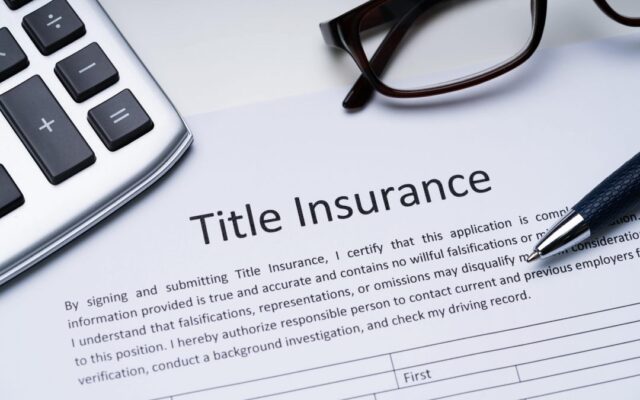
Besides purchasing a new automobile, purchasing a house will probably be the biggest investment you make during your lifetime. Because of this, the least beneficial thing you would want to happen is discovering a hidden issue revolving around the deed of the residence after you have already signed the papers and finished the transaction. Nonetheless, this is exactly how title insurance could be helpful.
However, what is this insurance type and how does it protect homebuyers? Fortunately for all people that are wondering about the same thing, the article below might shed some light on the entire topic. Let’s take a closer look at what this insurance is, as well as how it can be beneficial for you:

Title Insurance: Explained
Before we look at some other key things that you should know, it’s important that you first learn and understand what this insurance type is. Simply said, title insurance will protect two parties against any intricacies with the deed – the lending company and the person who is thinking about purchasing a house with a deed that needs to be assigned when the sale is done.
So, if there are any dilemmas with the deed before, throughout, or after the purchase is done, the title insurance organization may be liable for funding specific legal fees, but this will mostly rely on the policy an individual has opted for. The deed to a residence is connected to the constitutional rights the landlord has to a specific estate.
When you obtain an estate, you must ensure that it has a transparent title or that it is completely freed from any debt, as well as other title claims. If you don’t ensure this as the purchaser of the estate, you may end up being liable for solving any issues if you don’t have this insurance.

So, How Does it Function?
Generally speaking, getting this coverage will require 2 steps. Firstly, an insurance organization such as Sunnysidetitle.com will execute an ownership search in order to guarantee that the estate you wish to buy has a transparent and legal deed. Basically, they’ll be reviewing if the individual marketing the house truly owns it and actually has the power to sell it to another person. If they learn that there are dilemmas with the title, they’ll definitely inform you about the defect.
Once the organization you opted for confirms that there are some risks or if they learn that the deed is entirely clear, they’ll begin the underwriting process. What does this mean? Well, it indicates that they’ll assess any issues – if any – they’ll double-check if there are any hidden ones, and they’ll then suggest a quote for a policy based on all the risks they discovered. Keep in mind, if there are too many intricacies, the organization may reject providing you with a policy.

What Will it Cover?
As mentioned earlier, title coverage will protect the buyer from any potential risks with the deed of the property. There are various risks and issues that could appear, and the most common ones include:
- Forged Papers And Signatures – there is always a risk of someone forging the ownership paper and then simply selling the house in order to make some cash. This will certainly put anyone who has bought the house at risk, mostly because they’re paying for the residence that they don’t really own. The forged papers and/or signatures make the document completely illegal since it has never been properly recorded.
- Built-Up Liens – these are basically documents that are legally attached to the estate and their purpose is to serve as a notice that the owner owes money to another individual. In most cases, this can include alimony or construction liens that serve as a guarantee that the contractors will be paid. If these liens aren’t found during the deed search, the new owner might still be legally obligated to pay the money owed.
- Mistakes on The Documents – you might not realize this, but mistakes do happen. This is why a particular document might not show up during the initial search due to the fact that a name, surname, or address has been misspelled. But, legally, that paper might still be connected to the estate you purchased, which means that you might have ended up buying a house that has an open mortgage, meaning that you’ll have to pay for it.

FAQ: Answered
Before we conclude this article, it’s important that we mention a few FAQ that you may have, which includes things such as:
- How Much is It? – Firstly, you should understand that it is a one-time payment that will range from 0.50% to 1% of the entire estate’s value. Now, it may or may not be governed in the state you reside in, which implies that their expenses could easily vary. In most situations, it’s paid during the closing process.
- Do I Require it? – Yes, you do. Even if the mortgage lender doesn’t require it, you should still obtain it, especially since it’ll protect both you and the lending firm. If you don’t obtain it, and any obstacles arise in the future, you’ll be liable for compensating the debts including any unpaid taxes, liens, and so on.
- How Do I Find an Insurer? – Like everything else, you can find an insurer online. Once you make a list of the potential candidates, ensure that you read all the reviews in order to determine whether or not they’re reliable and trustworthy. Additionally, compare everything, from the services they offer to the costs they have.
Conclusion
If you’re planning on acquiring a property, you should strongly consider getting title insurance. By doing so, you’ll be capable of ensuring that there aren’t any problems with the deed of the estate, but more importantly, you’ll ensure that you don’t have to spend money for any debts that the previous homeowner had.
So, now that you’re aware of all the benefits this insurance might provide you with, you shouldn’t lose any more of your time. Instead, open up your browser, and start searching for an organization that will make sure that there aren’t any issues with the ownership and title of the house you’re thinking about buying.






